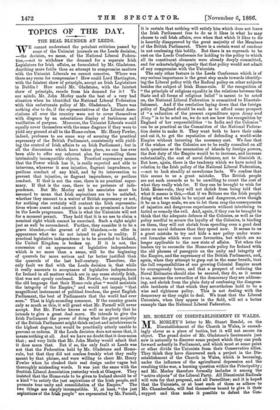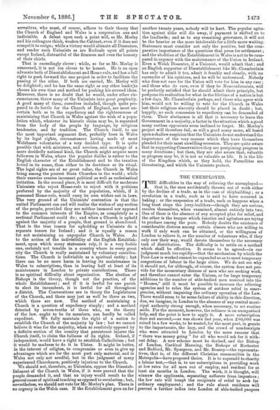MR. MORLEY ON DISESTABLISHMENT IN WALES.
MR. MORLEY'S letter to Mr. Stuart Rendel, on the Disestablishment of the Church in Wales, is exceed- ingly clever as a piece of tactics, but it will not secure its object. The grand desire of Mr. Gladstone's lieutenants just now is naturally to discover some project which they can push forward ardently in Parliament, and which must at some point or other divide the Unionists from their Conservative allies. They think they have discovered such a project in the Dis- establishment of the Church in Wales, which is becoming, under the influence of the agricultural depression and the resulting tithe war, a burning question within the Principality; and Mr. Morley therefore formally includes it among the "active objects" of the Liberal Party. All Disunionist Radicals will vote for that proposal, and all Parnellites; and it is hoped that the Unionists, or at least such of them as adhere to Mr. Chamberlain, will feel themselves bound to give it their support and thus make it possible to defeat the Con-
servatives, who must, of course, adhere to their theory that the Church of England and Wales is a corporation one and indivisible. A defeat upon such a point will, as Mr. Morley and his colleagues think, weaken the Cabinet, even if it does not compel it to resign; while a victory would alienate all Dissenters, and render such Unionists as are Radicals upon all points except Ireland, distrustful of the firmness and even the honesty of their chiefs.
That is exceedingly clever ; while, so far as Mr. Morley is concerned, it is not too clever to be honest. He is an open advocate both of Disestablishment and Home-rule, and has a full right to push forward the one project in order to facilitate the passing of the other. If both are carried, Mr. Morley will be delighted ; and he has the same right as any other leader:to choose his own time and method for pushing his avowed ideas. Moreover, there is no doubt that lie would, under other cir- cumstances, throw many of the Unionists into great perplexity. A good many of them, ourselves included, though quite pre- pared to do battle for the Church of England, are most un- certain both as to the expediency and the righteousness of maintaining that Church in Wales against the wish of a popu- lation which, whatever its historic claim may be, is separated from the body of the people by language, by religious tendencies, and by tradition. The Church itself, to use the most important argument first, probably loses in Wales by its legal rights, circumstances having made of most Welshmen voluntaries of a very decided type. It is quite possible that with ministers, and services, and meetings of a more decidedly national kind, the Church might acquire more followers in Wales, where the popular dislike is rather to the English character of the Establishment and to the taxation levied in its name, than either to its doctrines or its ritual. The legal rights are of no great value, the Church in Wales being among the poorest State Churches in the world ; while their exercise creates incessant political as well as ecclesiastical irritation. In the second place, it is most difficult for moderate Unionists who reject Home-rule to reject with it petitions preferred by the majority of the population, which, if it possessed Home-rule, would carry its own wishes out in laws. The very ground of the Unionists' contention is that the united Parliament can and will realise the wishes of any section of the people, provided they are neither immoral nor opposed to the common interests of the Empire, as completely as a sectional Parliament could do ; and when a Church is upheld against the majority of a people, that ground is abandoned. That is the true reason for upholding as Unionists do a separate tenure for Ireland ; and it is equally a reason for not maintaining an unpopular Church in Wales. As to the notion of the indivisibility of the English Establish- ment, upon which many statesmen rely, it is a very feeble one, certainly not tenable in a country where in every great city the Church is really maintained by voluntary contribu- tions. The Church is indivisible as a spiritual entity ; but there can be no more harm in leaving its maintenance in Wales to subscriptions, than in leaving half at least of its maintenance in London to private contributions. There is no spiritual difficulty about organisation. The election of Bishops is the theory, though not the practice, of the whole Establishment ; and if it is lawful for one parish to elect its incumbent, it is lawful for all throughout a district. The Convocations are in theory the Legislatures of the Church, and there may just as well be three as two, which there are now. The method of maintaining a Church is a question of expediency simply ; and a method detested by seven-tenths of those who, on the theory of the law, ought to be its members, can hardly be called expedient. We fully maintain the right of a nation to establish the Church of the majority by law ; but we cannot believe it wise for the majority, when so resolutely opposed by a definite section of the country that persistence injures the Church itself, to claim the fullness of its rights. Ireland, if independent, would have a right to establish Catholicism ; but it would be madness to do it in Ulster. It might be better, in the interest of religion, to compromise or even to give up advantages which are for the most part only material, and in Wales not only not needful, but in the judgment of many experienced Churchmen, positively injurious to the Church. We should not, therefore, as Unionists, oppose the Disestab- lishment of the Church in Wales, if it were proved that the people demanded it, and that no injury would result to the general cause of spiritual teaching as opposed to secularism ; but, nevertheless, we should not vote for Mr. Morley's plan. There is no urgency in the Welsh case. If the Establishment goes on for another twenty years, nobody will be hurt. The popular agita- tion against tithe will die away, if payment is shifted on to the landlords ; and as to any remaining grievance, it will not be the heavier or the more intolerable for a little more waiting. Statesmen must consider not only the positive, but the com- parative importance of the questions that press for settlement ; and the abolition of the Establishment in Wales is not to be com- pared in urgency with the maintenance of the Union in Ireland. Even a Welsh Dissenter, if a Unionist, would admit that ; and an English supporter of Disestablishment like Mr. Chamberlain has only to admit it too, admit it frankly and clearly, with no surrender of his opinions, and he will be understood. Nobody who does not care for the Union will vote for him in any case ; and those who do care, even if they be Nonconformists, will be perfectly satisfied that he should admit their principle, but postpone its realisation for what in the lifetime of a nation is but a few days. Mr. Chamberlain perhaps, and those who agree with him, would not be willing to vote for the Church in Wales lest their religious sincerity should be placed in doubt ; but, happily, no such concession to expediency can be demanded of them. Their abstinence is all that is necessary to leave the• Government in a majority, a factor in the situation which a good many restless opponents seem inclined to forget. Mr. Morley's project will therefore fail, as will a good many more, all based upon a shallow suspicion that the Unionists do not understand the importance of the very reasons which they have themselves pleaded for their most unwilling secession. They are quite aware that in supporting Conservatives they are postponing progress in many directions ; but then, they are also aware that, valuable as progress may be, it is not so valuable as life. It is the life of the Kingdom which, as they hold, the Parnellites are threatening, and which the Unionists protect.















































 Previous page
Previous page